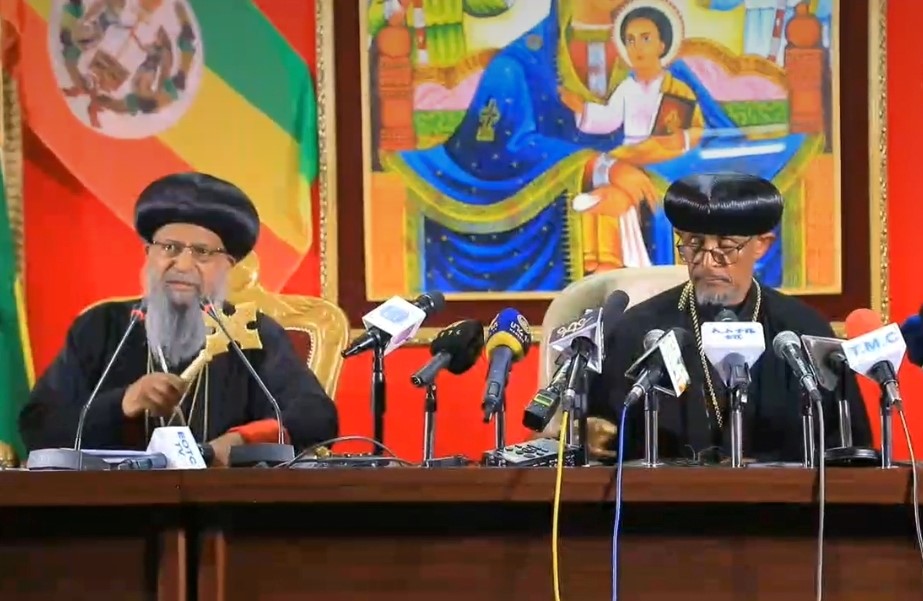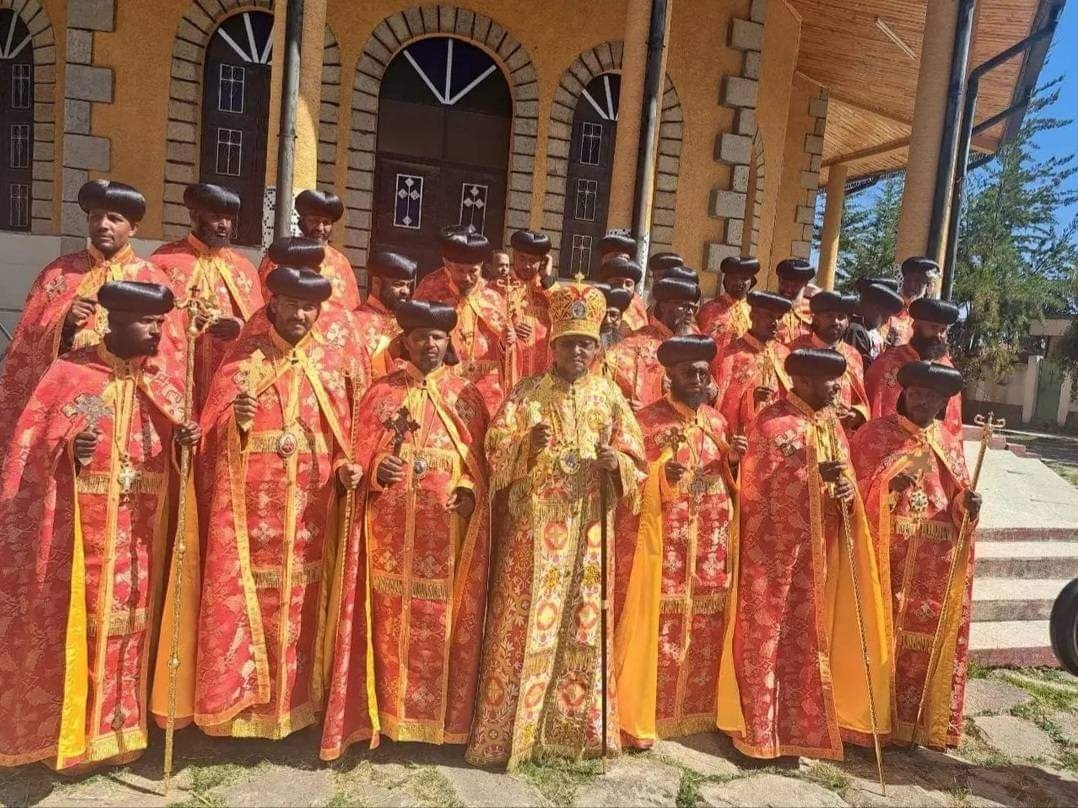A Detailed Article on the Present Issues in Ethiopian Orthodox Tewahedo Church

His Holiness Abune Mathias – Sixth Patriarch and Catholicos of Ethiopia, Ichege of the See of St. Tekle Haymanot, Archbishop of Axum and H.G Abune Petros, the General Secretary of the Synod
Menetasnot Desta – Delegate of Horn of Africa & Head of Ethiopian Affairs – OCP News Service– 28/01/2023
Addis-Ababa-Ethiopia: The emergency meeting of the Holy Synod of the Ethiopian Orthodox Tewahedo Church commenced at the Patriarchate on January 25, 2023, suspended and defrocked three bishops and 25 monks on January 26, 2023. Check our detailed article below on the current issues in the Ethiopian Orthodox Church.
Former archbishops and monks who claimed themselves as disappointed by the church administration, particularly on the issue of serving ethnically and lingually diverse people, form an uncanonized group against the Ethiopian Orthodox Thwahedo Church’s legal holy synod.
- What was the real incident?
On Sunday, January 22, 2023, three former archbishops namely Sawiros, Ewestatios and Zena Markos consecrated 26 former monks as a bishop at southwest Showa Diocese, Sodo Dacho woreda Nativity of Christ (balewold) church without the knowledge and direction of the official holy synod.
The assigned bishops and their dioceses are as follows:
- Abba Gabre Mariyam negassa – Bishop of the Diocese of West wollega
- Abba Teklehaymanot Woldu – Bishop of the Diocese of Dredawa
- Abba Gabriel Wolde Yohans – Bishop of the Diocese of Gurage sodo
- Abba Gebre Egziabher Taddele – bishop of the Diocese of West Arsi.
- Abba Gebre Michael Gabre Mariyam – Bishop of the Diocese of kenbata
- Abba Hailu Endale – Bishop of the Diocese of Eastern Harerge
- Abba Tekele Mariyam Seme – Bishop of the Diocese of Guji and Libon
- Abba Haile Iyesus Mengistu – Bishop of the Diocese of Keffa
- Abba Wolde Iyesus Iffu – Bishop of the Diocese of Kelem Wollega
- Abba Paulos kebede – Bishop of the Diocese of Hadiya
- Abba Welde Iyesus Tesfaye – Bishop of the Diocese of Eastern wollega
- Abba Welde Iyesus Geleta – Bishop of the Diocese of Horu Guderu Wellega
- Abba Tsegazeab Adugna – the head Bishop of Moher Iyesus Monastery
- Abba Haile Mariyam Getachew – Bishop of the Diocese of Western Harerge
- Abba Welde Giyorgis Welde Michael – Bishop of the Diocese of Kemisse
- Abba Estifanos Gebre – Bishop of the Diocese of Bale
- Abba Gebre Medihen Gebre Mariyam – Bishop of the Diocese of Goffa and Basketo
- Abba Haile Michael neguse – Bishop of the Diocese of Ginner
- Abba Abreham Meskele – Bishop of the Diocese of Dawero and konta
- Abba Newaye Selase – Bishop of the Diocese of western guji
- Abba Kidane Mariyam Tolosa – Bishop of the Diocese of Jimma and Yem
- Abba Woldemariyam Tsega – Bishop of the Diocese of Borena
- Abba Amede Michael Haile – Bishop of the Diocese of Arusi
- Abba Mereha Tsidek Haile Mariyam – Bishop of the Diocese of Gedio, Burji and Amaro
- Abba Mogges Haile Mariyam – the head Bishop of the Menagesha Mariyam (St. Mary) and Gara Medehaniyalem (Holy Saviour) monastery and Debre tsehay St. George church
- Abba Gebre Iyesus Neguse – Bishop of the Diocese of Bunno Bedele
The above uncanonically assigned former monks served the church in different positions at different parishes and dioceses across the country. And some of them were accused of engaging in ethnocentric and Protestant reformation movements
- What was the stand of the Uncanoncial group on the consecration of bishops?
Former bishop Sawiros stated on the Sunday night press release of the uncanonized group in Oromia broadcast service (OBS) TV that for the last 60 years, bishops from the specific ethnic group were consecrated and assigned to dioceses in Oromia and other parts of Ethiopia, where they were unfamiliar with the language and culture of the faithful. Besides that, in Oromiya and southern parts of the country, one archbishop was assigned to multiple dioceses, which led the church to be weak and millions of its children to leave the church in the absence of shepherds.
In his speech, he state that “we and the Holy Spirit decided for the benefit of the church and its children”
- What was the action of EOTC?
After the uncanonized consecration of bishops, the permanent synod made a release on the church’s official tv (EOTC tv) which included the following instructions;
1. All bishops across the world called for an emergency synodal meeting.
2. Faithful to align with the decision of the holy synod.
3. The government should ensure the church’s safety and security.
After this statement, several dioceses, associations, and institutions as well as parish churches released statements against the uncanonical action and reannouncing solidarity with the church, patriarch, and holy synod.
On January 23, 2023, the Patriarchate Office Administration Council suspended the former bishops and monks from their administrative position and salary and ordered to close their homes and offices.
On January 25, the Holy Synod start its synodal meeting in prayer at the patriarchate St. Mary Monastery and declared 3 days of prayer from January 26-28 for all faithful and parishes.
After the emergency meeting which ended on January 26, 2023, H.G Abune Petros, the General Secretary of the Synod, informed the public that the synod examined the act according to the Holy Bible, the Canon of the church, and the holy apostolic tradition of the church and pass the following decision.
- The spiritual authority, name, and title (from their deaconhood to their current status) of the 3 archbishops and 25 bishops are to be taken and they are to be called by their surname.
- To excommunicate them and not receive service in the church throughout their lives and after their deaths.
- New Archbishops will be assigned to dioceses that have become vacant due to the ex-communication.
- To prepare the creation of awareness among the faithful, government bodies, and institutions that work with the Ethiopian Orthodox Church.
- Requested all church and non-church servants and persons to stand with the decisions and the patriarchate commanded them to pass necessary administrative and legal measures for those who stand against the church decision.
- All church authorities, clergy, Sunday school members, and faithful are obligated to protect the church from unlawful acts of ex-communication and to support those who do so.
- No one may use the church’s name, books, instruments, or heritage in whole or in part.
- To create a team to study the issue and to submit a set of solutions for the current problem
The Ethiopian Church through the statement also informed all Orthodox Churches, the Roman Catholic church, and institutions like the World Council of Churches and inter-religious forms of the announcement on the excommunicated individuals and made clear that they don’t represent the church at any stage.
- What was the stand of the Other churches?
The Coptic Church expressed its solidarity with the decision taken by the synod and added that the church doesn’t recognize any splinter groups in the Ethiopian Church. The Coptic Church reaffirmed its cooperation with Patriarch Abuna Mathias of Ethiopia. Other sister churches have also initiated a letter of solidarity to the Ethiopian Church, Patarich, and Synod.
- What is the current status of those 28 individuals?
According to the reports the uncanonized group is currently staying in different hotels and guesthouses in Addis Ababa.
Of the assigned 26 bishops, 1 monk, namely Abba Tsegazeab Adugna, returned to the mother church by asking forgiveness through letter and in person before the synodal meeting, and he was not included in the list of excommunicated individuals.
The OCP also received news from a trustworthy source about Abba Tekle Haymanot Weldu’s position change. But the trial to confirm the news from him was unsuccessful until this news was prepared.

Source:
OCP News Service
